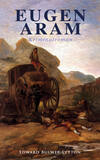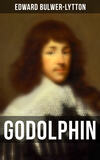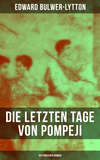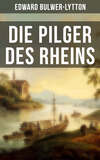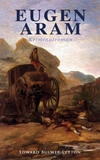Kitabı oku: «The Disowned — Complete», sayfa 10
But I was then too closely bound to the world not to be perpetually reminded of its events. My retreat was thronged with occasional migrators from London; my books were mingled with the news and scandal of the day. All spoke to me of Lady Merton; not as I loved to picture her to myself, pale and sorrowful, and brooding over my image; but gay, dissipated, the dispenser of smiles, the prototype of joy. I contrasted this account of her with the melancholy and gloom of my own feelings, and I resented her seeming happiness as an insult to myself.
In this angry and fretful mood I returned to London. My empire was soon resumed; and now, Linden, comes the most sickening part of my confessions. Vanity is a growing and insatiable disease: what seems to its desires as wealth to-day, to-morrow it rejects as poverty. I was at first contented to know that I was beloved; by degrees, slow, yet sure, I desired that others should know it also. I longed to display my power over the celebrated and courted Lady Merton; and to put the last crown to my reputation and importance. The envy of others is the food of our own self-love. Oh, you know not, you dream not, of the galling mortifications to which a proud woman, whose love commands her pride, is subjected! I imposed upon Caroline the most humiliating, the most painful trials; I would allow her to see none but those I pleased; to go to no place where I withheld my consent; and I hesitated not to exert and testify my power over her affections, in proportion to the publicity of the opportunity.
Yet, with all this littleness, would you believe that I loved Caroline with the most ardent and engrossing passion? I have paused behind her, in order to kiss the ground she trod on; I have stayed whole nights beneath her window, to catch one glimpse of her passing form, even though I had spent hours of the daytime in her society; and, though my love burned and consumed me like a fire, I would not breathe a single wish against her innocence, or take advantage of my power to accomplish what I knew from her virtue and pride no atonement could possibly repay. Such are the inconsistencies of the heart, and such, while they prevent our perfection, redeem us from the utterness of vice! Never, even in my wildest days, was I blind to the glory of virtue, yet never, till my latest years, have I enjoyed the faculty to avail myself of my perception. I resembled the mole, which by Boyle is supposed to possess the idea of light, but to be unable to comprehend the objects on which it shines.
Among the varieties of my prevailing sin, was a weakness common enough to worldly men. While I ostentatiously played off the love I had excited I could not bear to show the love I felt. In our country, and perhaps, though in a less degree, in all other highly artificial states, enthusiasm or even feeling of any kind is ridiculous; and I could not endure the thought that my treasured and secret affections should be dragged from their retreat to be cavilled and carped at by—
“Every beardless, vain comparative.”
This weakness brought on the catastrophe of my love; for, mark me, Clarence, it is through our weaknesses that our vices are punished! One night I went to a masquerade; and, while I was sitting in a remote corner, three of my acquaintances, whom I recognized, though they knew it not, approached and rallied me upon my romantic attachment to Lady Merton. One of them was a woman of a malicious and sarcastic wit; the other two were men whom I disliked, because their pretensions interfered with mine; they were diners-out and anecdote-mongers. Stung to the quick by their sarcasms and laughter, I replied in a train of mingled arrogance and jest; at last I spoke slightingly of the person in question; and these profane and false lips dared not only to disown the faintest love to that being who was more to me than all on earth, but even to speak of herself with ridicule and her affection with disdain.
In the midst of this, I turned and beheld, within hearing, a figure which I knew upon the moment. O Heaven! the burning shame and agony of that glance! It raised its mask—I saw that blanched cheek, and that trembling lip! I knew that the iron had indeed entered into her soul.
Clarence, I never beheld her again alive. Within a week from that time she was a corpse. She had borne much, suffered much, and murmured not; but this shock pressed too hard, came too home, and from the hand of him for whom she would have sacrificed all! I stood by her in death; I beheld my work; and I turned away, a wanderer and a pilgrim upon the face of the earth. Verily, I have had my reward.
The old man paused, in great emotion; and Clarence, who could offer him no consolation, did not break the silence. In a few minutes Talbot continued—
From that time the smile of woman was nothing to me: I seemed to grow old in a single day. Life lost to me all its objects. A dreary and desert blank stretched itself before me: the sounds of creation had only in my ears one voice; the past, the future, one image. I left my country for twenty years, and lived an idle and hopeless man in the various courts of the Continent.
At the age of fifty I returned to England; the wounds of the past had not disappeared, but they were scarred over; and I longed, like the rest of my species, to have an object in view. At that age, if we have seen much of mankind and possess the talents to profit by our knowledge, we must be one of two sects,—a politician or a philosopher. My time was not yet arrived for the latter, so I resolved to become the former; but this was denied me, for my vanity had assumed a different shape. It is true that I cared no longer for the reputation women can bestow; but I was eager for the applause of men, and I did not like the long labour necessary to attain it. I wished to make a short road to my object, and I eagerly followed every turn but the right one, in the hopes of its leading me sooner to my goal.
The great characteristic of a vain man in contradistinction to an ambitious man, his eternal obstacle to a high and honourable fame, is this: he requires for any expenditure of trouble too speedy a reward; he cannot wait for years, and climb, step by step, to a lofty object; whatever he attempts, he must seize at a single grasp. Added to this, he is incapable of an exclusive attention to one end; the universality of his cravings is not contented, unless it devours all; and thus he is perpetually doomed to fritter away his energies by grasping at the trifling baubles within his reach, and in gathering the worthless fruit which a single sun can mature.
This, then, was my fault, and the cause of my failure. I could not give myself up to finance, nor puzzle through the intricacies of commerce: even the common parliamentary drudgeries of constant attendance and late hours were insupportable to me; and so after two or three “splendid orations,” as my friends termed them, I was satisfied with the puffs of the pamphleteers and closed my political career. I was now, then, the wit and the conversationalist. With my fluency of speech and variety of information, these were easy distinctions; and the popularity of a dinner-table or the approbation of a literary coterie consoled me for the more public and more durable applause I had resigned.
But even this gratification did not last long. I fell ill; and the friends who gathered round the wit fled from the valetudinarian. This disgusted me, and when I was sufficiently recovered I again returned to the Continent. But I had a fit of misanthropy and solitude upon me, and so it was not to courts and cities, the scenes of former gayeties, that I repaired; on the contrary, I hired a house by one of the most sequestered of the Swiss lakes, and, avoiding the living, I surrendered myself without interruption or control to commune with the dead. I surrounded myself with books and pored with a curious and searching eye into those works which treat particularly upon “man.” My passions were over, my love of pleasure and society was dried up, and I had now no longer the obstacles which forbid us to be wise; I unlearned the precepts my manhood had acquired, and in my old age I commenced philosopher; Religion lent me her aid, and by her holy lamp my studies were conned and my hermitage illumined.
There are certain characters which in the world are evil, and in seclusion are good: Rousseau, whom I knew well, is one of them. These persons are of a morbid sensitiveness, which is perpetually galled by collision with others. In short, they are under the dominion of VANITY; and that vanity, never satisfied and always restless in the various competitions of society, produces “envy, hatred, malice, and all uncharitableness!” but, in solitude, the good and benevolent dispositions with which our self-love no longer interferes have room to expand and ripen without being cramped by opposing interests: this will account for many seeming discrepancies in character. There are also some men in whom old age supplies the place of solitude, and Rousseau’s antagonist and mental antipodes, Voltaire, is of this order. The pert, the malignant, the arrogant, the lampooning author in his youth and manhood, has become in his old age the mild, the benevolent, and the venerable philosopher. Nothing is more absurd than to receive the characters of great men so implicitly upon the word of a biographer; and nothing can be less surprising than our eternal disputes upon individuals: for no man throughout life is the same being, and each season of our existence contradicts the characteristics of the last.
And now in my solitude and my old age, a new spirit entered within me: the game in which I had engaged so vehemently was over for me; and I joined to my experience as a player my coolness as a spectator; I no longer struggled with my species, and I began insensibly to love them. I established schools and founded charities; and, in secret but active services to mankind, I employed my exertions and lavished my desires.
From this amendment I date the peace of mind and elasticity which I now enjoy; and in my later years the happiness which I pursued in my youth and maturity so hotly, yet so ineffectually, has flown unsolicited to my breast.
About five years ago I came again to England, with the intention of breathing my last in the country which gave me birth. I retired to my family home; I endeavoured to divert myself in agricultural improvements, and my rental was consumed in speculation. This did not please me long: I sought society,—society in Yorkshire! You may imagine the result: I was out of my element; the mere distance from the metropolis, from all genial companionship, sickened me with a vague feeling of desertion and solitude; for the first time in my life I felt my age and my celibacy. Once more I returned to town, a complaint attacked my lungs, the physicians recommended the air of this neighbourhood, and I chose the residence I now inhabit. Without being exactly in London, I can command its advantages, and obtain society as a recreation without buying it by restraint. I am not fond of new faces nor any longer covetous of show; my old servant therefore contented me: for the future, I shall, however, to satisfy your fears, remove to a safer habitation, and obtain a more numerous guard. It is, at all events, a happiness to me that Fate, in casting me here and exposing me to something of danger, has raised up in you a friend for my old age, and selected from this great universe of strangers one being to convince my heart that it has not outlived affection. My tale is done; may you profit by its moral!
When Talbot said that our characters were undergoing a perpetual change he should have made this reservation,—the one ruling passion remains to the last; it may be modified, but it never departs; and it is these modifications which do, for the most part, shape out the channels of our change; or as Helvetius has beautifully expressed it, “we resemble those vessels which the waves still carry towards the south, when the north wind has ceased to blow;” but in our old age, this passion, having little to feed on, becomes sometimes dormant and inert, and then our good qualities rise, as it were from an incubus, and have their sway.
Yet these cases are not common, and Talbot was a remarkable instance, for he was a remarkable man. His mind had not slept while the age advanced, and thus it had swelled as it were from the bondage of its earlier passions and prejudices. But little did he think, in the blindness of self-delusion,—though it was so obvious to Clarence, that he could have smiled if he had not rather inclined to weep at the frailties of human nature,—little did he think that the vanity which had cost him so much remained “a monarch still,” undeposed alike by his philosophy, his religion, or his remorse; and that, debarred by circumstances from all wider and more dangerous fields, it still lavished itself upon trifles unworthy of his powers and puerilities dishonouring his age. Folly is a courtesan whom we ourselves seek, whose favours we solicit at an enormous price, and who, like Lais, finds philosophers at her door scarcely less frequently than the rest of mankind!
CHAPTER XXI
Mrs. Trinket. What d’ye buy, what d’ye lack, gentlemen? Gloves, ribbons, and essences,—ribbons, gloves, and essences.
ETHEREGE.
“And so, my love,” said Mr. Copperas, one morning at breakfast, to his wife, his right leg being turned over his left, and his dexter hand conveying to his mouth a huge morsel of buttered cake,—“and, so my love, they say that the old fool is going to leave the jackanapes all his fortune?”
“They do say so, Mr. C.; for my part I am quite out of patience with the art of the young man; I dare say he is no better than he should be; he always had a sharp look, and for aught I know there may be more in that robbery than you or I dreamed of, Mr. Copperas. It was a pity,” continued Mrs. Copperas, upbraiding her lord with true matrimonial tenderness and justice, for the consequences of his having acted from her advice,—“it was a pity, Mr. C., that you should have refused to lend him the pistols to go to the old fellow’s assistance, for then who knows but—”
“I might have converted them into pocket pistols,” interrupted Mr. C., “and not have overshot the mark, my dear—ha, ha, ha!”
“Lord, Mr. Copperas, you are always making a joke of everything.”
“No, my dear, for once I am making a joke of nothing.”
“Well, I declare it’s shameful,” cried Mrs. Copperas, still following up her own indignant meditations, “and after taking such notice of Adolphus, too, and all!”
“Notice, my dear! mere words,” returned Mr. Copperas, “mere words, like ventilators, which make a great deal of air, but never raise the wind; but don’t put yourself in a stew, my love, for the doctors say that copperas in a stew is poison!”
At this moment Mr. de Warens, throwing open the door, announced Mr. Brown; that gentleman entered, with a sedate but cheerful air. “Well, Mrs. Copperas, your servant; any table-linen wanted? Mr. Copperas, how do you do? I can give you a hint about the stocks. Master Copperas, you are looking bravely; don’t you think he wants some new pinbefores, ma’am? But Mr. Clarence Linden, where is he? Not up yet, I dare say. Ah, the present generation is a generation of sluggards, as his worthy aunt, Mrs. Minden, used to say.”
“I am sure,” said Mrs. Copperas, with a disdainful toss of the head, “I know nothing about the young man. He has left us; a very mysterious piece of business indeed, Mr. Brown; and now I think of it, I can’t help saying that we were by no means pleased with your introduction: and, by the by, the chairs you bought for us at the sale were a mere take-in, so slight that Mr. Walruss broke two of them by only sitting down.”
“Indeed, ma’am?” said Mr. Brown, with expostulating gravity; “but then Mr. Walruss is so very corpulent. But the young gentleman, what of him?” continued the broker, artfully turning from the point in dispute.
“Lord, Mr. Brown, don’t ask me: it was the unluckiest step we ever made to admit him into the bosom of our family; quite a viper, I assure you; absolutely robbed poor Adolphus.”
“Lord help us!” said Mr. Brown, with a look which “cast a browner horror” o’er the room, “who would have thought it? and such a pretty young man!”
“Well,” said Mr. Copperas, who, occupied in finishing the buttered cake, had hitherto kept silence, “I must be off. Tom—I mean de Warens—have you stopped the coach?”
“Yees, sir.”
“And what coach is it?”
“It be the Swallow, sir.”
“Oh, very well. And now, Mr. Brown, having swallowed in the roll, I will e’en roll in the Swallow—Ha, ha, ha!—At any rate,” thought Mr. Copperas, as he descended the stairs, “he has not heard that before.”
“Ha, ha!” gravely chuckled Mr. Brown, “what a very facetious, lively gentleman Mr. Copperas is. But touching this ungrateful young man, Mr. Linden, ma’am?”
“Oh, don’t tease me, Mr. Brown, I must see after my domestics: ask Mr. Talbot, the old miser in the next house, the havarr, as the French say.”
“Well, now,” said Mr. Brown, following the good lady down stairs, “how distressing for me! and to say that he was Mrs. Minden’s nephew, too!”
But Mr. Brown’s curiosity was not so easily satisfied, and finding Mr. de Warens leaning over the “front” gate, and “pursuing with wistful eyes” the departing “Swallow,” he stopped, and, accosting him, soon possessed himself of the facts that “old Talbot had been robbed and murdered, but that Mr. Linden had brought him to life again; and that old Talbot had given him a hundred thousand pounds, and adopted him as his son; and that how Mr. Linden was going to be sent to foreign parts, as an ambassador, or governor, or great person; and that how meester and meeses were quite ‘cut up’ about it.”
All these particulars having been duly deposited in the mind of Mr. Brown, they produced an immediate desire to call upon the young gentleman, who, to say nothing of his being so very nearly related to his old customer, Mrs. Minden, was always so very great a favourite with him, Mr. Brown.
Accordingly, as Clarence was musing over his approaching departure, which was now very shortly to take place, he was somewhat startled by the apparition of Mr. Brown—“Charming day, sir,—charming day,” said the friend of Mrs. Minden,—“just called in to congratulate you. I have a few articles, sir, to present you with,—quite rarities, I assure you,—quite presents, I may say. I picked them up at a sale of the late Lady Waddilove’s most valuable effects. They are just the things, sir, for a gentleman going on a foreign mission. A most curious ivory chest, with an Indian padlock, to hold confidential letters,—belonged formerly, sir, to the Great Mogul; and a beautiful diamond snuff-box, sir, with a picture of Louis XIV. on it, prodigiously fine, and will look so loyal too: and, sir, if you have any old aunts in the country, to send a farewell present to, I have some charming fine cambric, a superb Dresden tea set, and a lovely little ‘ape,’ stuffed by the late Lady W. herself.”
“My good sir,” began Clarence.
“Oh, no thanks, sir,—none at all,—too happy to serve a relation of Mrs. Minden,—always proud to keep up family connections. You will be at home to-morrow, sir, at eleven; I will look in; your most humble servant, Mr. Linden.” And almost upsetting Talbot, who had just entered, Mr. Brown bowed himself out.
CHAPTER XXII
He talked with open heart and tongue,
Affectionate and true;
A pair of friends, though I was young
And Matthew seventy-two.
—WORDSWORTH.
Meanwhile the young artist proceeded rapidly with his picture. Devoured by his enthusiasm, and utterly engrossed by the sanguine anticipation of a fame which appeared to him already won, he allowed himself no momentary interval of relaxation; his food was eaten by starts, and without stirring from his easel; his sleep was brief and broken by feverish dreams; he no longer roved with Clarence, when the evening threw her shade over his labours; all air and exercise he utterly relinquished; shut up in his narrow chamber, he passed the hours in a fervid and passionate self-commune, which, even in suspense from his work, riveted his thoughts the closer to its object. All companionship, all intrusion, he bore with irritability and impatience. Even Clarence found himself excluded from the presence of his friend; even his nearest relation, who doted on the very ground which he hallowed with his footstep, was banished from the haunted sanctuary of the painter; from the most placid of human beings, Warner seemed to have grown the most morose.
Want of rest, abstinence from food, the impatience of the strained spirit and jaded nerves, all contributed to waste the health while they excited the genius of the artist. A crimson spot, never before seen there, burned in the centre of his pale cheek; his eye glowed with a brilliant but unnatural fire; his features grew sharp and attenuated; his bones worked from his whitening and transparent skin; and the soul and frame, turned from their proper and kindly union, seemed contesting, with fierce struggles, which should obtain the mastery and the triumph.
But neither his new prospects nor the coldness of his friend diverted the warm heart of Clarence from meditating how he could most effectually serve the artist before he departed from the country, It was a peculiar object of desire to Warner that the most celebrated painter of the day, who was on terms of intimacy with Talbot, and who with the benevolence of real superiority was known to take a keen interest in the success of more youthful and inexperienced genius,—it was a peculiar object of desire to Warner, that Sir Joshua Reynolds should see his picture before it was completed; and Clarence, aware of this wish, easily obtained from Talbot a promise that it should be effected. That was the least service of his zeal touched by the earnestness of Linden’s friendship, anxious to oblige in any way his preserver, and well pleased himself to be the patron of merit, Talbot readily engaged to obtain for Warner whatever the attention and favour of high rank or literary distinction could bestow. “As for his picture,” said Talbot (when, the evening before Clarence’s departure, the latter was renewing the subject), “I shall myself become the purchaser, and at a price which will enable our friend to afford leisure and study for the completion of his next attempt; but even at the risk of offending your friendship, and disappointing your expectations, I will frankly tell you that I think Warner overrates, perhaps not his talents, but his powers; not his ability for doing something great hereafter, but his capacity of doing it at present. In the pride of his heart, he has shown me many of his designs, and I am somewhat of a judge: they want experience, cultivation, taste, and, above all, a deeper study of the Italian masters. They all have the defects of a feverish colouring, an ambitious desire of effect, a wavering and imperfect outline, an ostentatious and unnatural strength of light and shadow; they show, it is true, a genius of no ordinary stamp, but one ill regulated, inexperienced, and utterly left to its own suggestions for a model. However, I am glad he wishes for the opinion of one necessarily the best judge: let him bring the picture here by Thursday; on that day my friend has promised to visit me; and now let us talk of you and your departure.”
The intercourse of men of different ages is essentially unequal: it must always partake more or less of advice on one side and deference on the other; and although the easy and unpedantic turn of Talbot’s conversation made his remarks rather entertaining than obviously admonitory, yet they were necessarily tinged by his experience, and regulated by his interest in the fortunes of his young friend.
“My dearest Clarence,” said he, affectionately, “we are about to bid each other a long farewell. I will not damp your hopes and anticipations by insisting on the little chance there is that you should ever see me again. You are about to enter upon the great world, and have within you the desire and power of success; let me flatter myself that you can profit by my experience. Among the ‘Colloquia’ of Erasmus, there is a very entertaining dialogue between Apicius and a man who, desirous of giving a feast to a very large and miscellaneous party, comes to consult the epicure what will be the best means to give satisfaction to all. Now you shall be this Spudaeus (so I think he is called), and I will be Apicius; for the world, after all, is nothing more than a great feast of different strangers, with different tastes and of different ages, and we must learn to adapt ourselves to their minds, and our temptations to their passions, if we wish to fascinate or even to content them. Let me then call your attention to the hints and maxims which I have in this paper amused myself with drawing up for your instruction. Write to me from time to time, and I will, in replying to your letters, give you the best advice in my power. For the rest, my dear boy, I have only to request that you will be frank, and I, in my turn, will promise that when I cannot assist, I will never reprove. And now, Clarence, as the hour is late and you leave us early tomorrow, I will no longer detain you. God bless you and keep you. You are going to enjoy life,—I to anticipate death; so that you can find in me little congenial to yourself; but as the good Pope said to our Protestant countryman, ‘Whatever the difference between us, I know well that an old man’s blessing is never without its value.’”
As Clarence clasped his benefactor’s hand, the tears gushed from his eyes. Is there one being, stubborn as the rock to misfortune, whom kindness does not affect? For my part, kindness seems to me to come with a double grace and tenderness from the old; it seems in them the hoarded and long purified benevolence of years; as if it had survived and conquered the baseness and selfishness of the ordeal it had passed; as if the winds, which had broken the form, had swept in vain across the heart, and the frosts which had chilled the blood and whitened the thin locks had possessed no power over the warm tide of the affections. It is the triumph of nature over art; it is the voice of the angel which is yet within us. Nor is this all: the tenderness of age is twice blessed,—blessed in its trophies over the obduracy of encrusting and withering years, blessed because it is tinged with the sanctity of the grave; because it tells us that the heart will blossom even upon the precincts of the tomb, and flatters us with the inviolacy and immortality of love.




